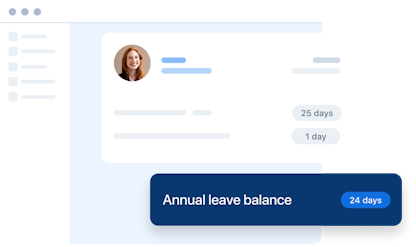- Blog
- |People management
- >Annual leave and absences
- >holiday-entitlement in the UK
What is Holiday Entitlement? An Employer's Overview


Holiday entitlement might sound like a breeze. But in reality, it can be a nightmare for people teams to administer here in the UK with all the statutory requirements and different allowances involved.
It’s not uncommon for people teams to field lots of questions from sun-craven employees. How much leave am I entitled to, and what will I get paid? Not only does this soak up valuable time, but it can be a lot to manage.
Having a solid system in place can make a world of difference. But let’s start with some basics - what exactly is holiday entitlement, and how does it work?
What is holiday entitlement?
Holiday entitlement - also known as annual leave here in the UK - is the amount of paid holiday time employees legally have a right to each year.
How much holiday an employee is entitled to will depend on a few factors, like whether they’re part-time or full-time (e.g. the number of days or hours they work) or whether they have additional agreements in place with you as their employer.
As with any type of leave, the specific terms of the employee contracts will outline when and how your employees can take their holiday.
What is the legal holiday entitlement in the UK?
In the UK, the minimum holiday entitlement is 5.6 times the number of hours or days a staff member works in a week. So, a full-time worker who works five days a week would be entitled to 28 days (or five days x 5.6).
It’s important to note that 28 days is the maximum statutory entitlement an employee is entitled to. For instance, if you have employees working 6 or 7 days a week, their entitlement would be capped at 28 days (in other words, you don’t need to do the calculation). That being said, companies can choose to offer their employees more leave if they desire and could even provide unlimited paid time off (PTO) as a benefit (but this has some pros and cons).
How does holiday entitlement work?
As we’ve just explored, holiday entitlement will look different depending on the number of hours or days an employee works during the week. Let’s look at the most common examples of this.
For full-time workers
Full-time employees working five days a week will get the standard UK holiday entitlement of 5.6 weeks of annual leave every year. In other words, they have 28 days (5 days * 5.6 weeks) they can take as paid leave, at a minimum.
Of course, as we’ve just seen, this is the maximum statutory entitlement available, so those working more days or longer hours in a week won’t automatically have a right to additional paid holiday.
For part-time workers
If an employee is on a part-time contract, then they must receive at least 5.6 weeks of paid holiday but on a pro-rata basis.
What that means is part-time workers only get a portion of the full entitlement, adjusted for the number of days they work each week. So, if a worker is on a two-day-a-week contract, they’ll get 11.2 days of annual leave (2 days * 5.6 weeks).
Find out more about holiday entitlement for part-time workers.
How is holiday entitlement calculated?
At a basic level, calculating holiday entitlement is pretty straightforward - you simply multiply the number of hours or days an employee works on average each week by 5.6.
insert calculator?
That being said, certain things further complicate calculating holiday pay, such as dealing with staff on irregular hours or who have been off work. You can learn more about what to do in each of these scenarios in our post on calculating holiday pay.
When does holiday entitlement reset?
Most businesses will choose to run their holiday year from January 1st to December 31st to align with the calendar year (though some companies may choose to align with the financial or tax year), and any holiday allowance (e.g. 28 days) will reset immediately after this.
For example, let’s say your holiday year aligns with the calendar year, and you’ve got an employee with five days left of holiday by December 31st. That means their leave will reset on January 1st, so they’ll have 28 days available then.
Can employees carry over leave?
Now, some businesses might choose to allow employees to carry over leave. In this case, the employee in the example above would have 33 days (28 days + 5 days carried over) available from January 1st. It’s important to note, however, that employees aren’t automatically entitled to carry-over (their working contract must state whether they do or not). The only exception to this is if the employee takes a long period of leave such as Maternity, Adoption or long-term sick leave. In the first two instances, the employee is entitled to carry over 5.6 weeks of annual leave, for long-term sick leave, it’s four weeks.
What if an employee has joined part-way through the holiday year?
Usually, an employee’s leave allowance will start from their first month of employment. So if an employee joins your company mid-year, their holiday allowance should be pro-rated based on this (e.g. if a full-time employee arrives six months in, they should only be entitled to 14 days holiday, not 28 days).
What about bank holidays? Can I include these as part of the entitlement?
Good question! The short answer is it’s up to you as an employer.
Some businesses have workers take bank holidays off as part of their annual leave entitlement. Others might pay for them in addition to their annual leave entitlement. The choice is up to your company.*
When an employee decides to leave your company, their full statutory entitlement will need to be pro-rated. That includes both statutory leave days and bank holidays. That being said, you can still split entitlement between statutory and bank holiday days.
How much notice do employees have to give to take leave?
Again, we can look to the UK Gov website for guidance here. According to them, employees should give their employer twice as much notice as the amount of time they intend to take off. So, if one of your employees wants to take one day off for a holiday, they should give you at least two days' notice right before this.
But this guidance is pretty standard and could vary depending on what their work contract states (which overrides what the government says).

Setting up a holiday policy
A holiday pay policy pretty much does what it says on the tin - it’s a way for your organisation to manage how and when your employees take their holiday. Having a clear policy in place will not only clear up any confusion but will also reduce employee queries about their holidays. In addition, it can help lower the risk of holiday entitlement misuse. Add in a solid system to help you manage your company’s holiday entitlement (like payroll software, just saying), and you’ll be off to the races.
To begin with, you’ll want to clarify a few things, like whether your organisation observes bank holidays (we discussed this earlier). You’ll also want to explain how much notice employees should give before planning and booking their holiday - again, as discussed before, you can vary this from standard government guidance as long as you make this clear in your employment contracts. You might even want to set up a holiday purchase scheme.
You might also want to outline when employees can or can’t take holidays. For instance, you can require employees to take time off during bank holidays like Christmas or New Year if you choose to close your business on these days.
In a similar way, you can restrict staff from taking days off during busy periods. Still, you don’t want to get in the way of workers taking their leave full stop - remember, workers have a right to holiday here in the UK. In fact, as an employer, you should do everything to encourage employees to take their annual leave. If you don’t, you’ll look bad in the eyes of UK law. If you ask employees not to take leave on specific days, you must give them a chance to take that leave at another time.


The 2024 UK National Living Wage - An Employer’s Guide

The Cost Of Recruitment In The UK - What You Might Not Know

UK National Insurance Changes for January 2024

End Of Tax Year 2023/2024 - Eight Key Changes For 24/25

Strategies to Reduce Employee Turnover

